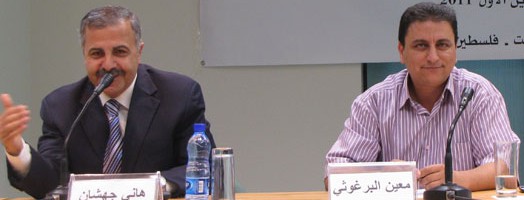Forensic Medicine and Family Issues
Birzeit: Tuesday, 18 October 2011 – The Institute of Law (IoL) at Birzeit University held a specialised seminar on the Role of Forensic Medicine in Family Issues on the Birzeit University campus. In addition to students of the Faculty of Law at the University, the seminar brought together representatives of official institution, civil society organisations, and interested bodies.
Having welcomed the audience, Mr. Mu’in Al- Barghouthi a Legal Researcher and the Project Manager at IoL, launched the seminar and introduced Dr. Hani Jahshan, forensic medicine consultant and specialist in family issues at the National Centre of Forensic Medicine in Jordan. Dr. Jahshan is now on a visit to Palestine and has participated in several events, including training of judges and lawyers. Mr. Al-Barghouthi explained that forensic medicine is a significant issue that concerns the Palestinian Judicial Authority, lawyers, and law students. The seminar focuses on the concept and role of forensic medicine in coping with domestic violence, especially violence against children and women. Al-Barghouthi also highlighted that the seminar would provide an opportunity to identify the scientific, medical opinion in medical issues that concern the justice sector.
Dr. Jahshan explained that forensic medicine plays a primary role in the society and family and helps prevent violence. In line with internationally approved definition, Dr. Jahshan made clear that domestic violence is a broad concept which includes violence against individuals and groups. In the course of identifying forms of violence, Dr. Jahshan elaborated on violence targeting children and women, including physical, psychological and sexual violence as well as negligence and deprivation. Dr. Jahshan also stressed that the Penal Law should be reviewed and updated because certain provisions allow room for violence. The State is further held responsible for violence, not only the persons who commit it. Domestic violence must be addressed by disseminating knowledge about all forms of violence and by developing educational curricula. Existing gaps between international standards and national laws, policies and practices should also be bridged. Additionally, a national multi-layer framework should be in place to curb violence. It will include prevention, detection, reporting, initial assessment, initial response, and intervention. To this avail, a single institution that operates a family section, specialised police division, physicians, social workers and psychiatrists, should be established.
The seminar on the Role of Forensic Medicine in Family Issues is one activity of the project of Curricula Development, Training of Judges, Public Prosecutors and Lawyers, and Local Government Staff. As part of the Millennium Development Goal (MDG) on Promoting Gender Equality and Empowering Women in the occupied Palestinian territory, six UN Agencies, namely UNDP/PAPP, UN-Women, ILO, UNESCO, UNFPA and UNRWA, are implementing a Joint Programme funded by the Government of Spain on Gender Equality and Women's Empowerment, covering the period 2009-2012. The Program aims to achieve three major outcomes:
- Reducing gender based violence and all form of violence against women and the girl child;
- Increasing the representation of women’s and women’s issues in decision making bodies; and
- Advancing equal opportunities for women’s economic participation, especially women survivors of gender based violence.
With reference to output 1.3 “Capacity to provide refuge, security, and access to justice strengthened” and output 2.2, “Organise training and workshops to raise awareness on gender in local authorities and related NGOs”, UNDP seeks to:
- Develop specialised curricula and training material and conduct training for judges, lawyers and prosecutors on gender issues and the provision of assistance to victims of violence and gender based violence.
- Provide gender awareness training to local government staff in 15 districts to develop their capacity on mainstreaming gender in district development planning and service provision.











